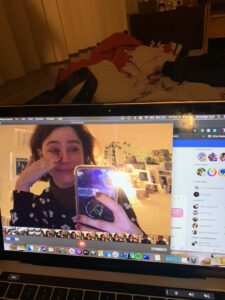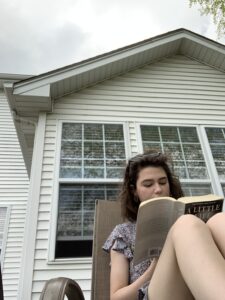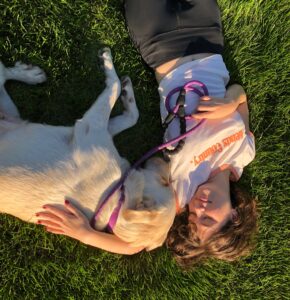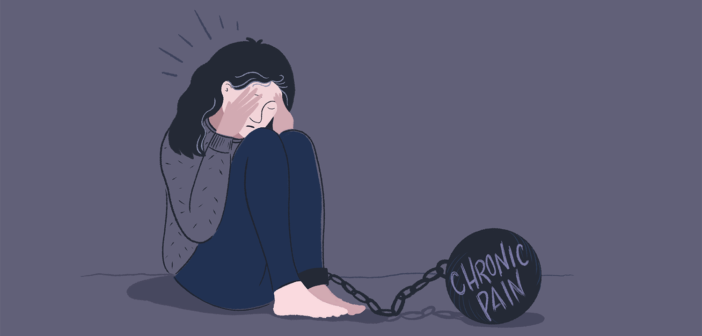At first, I’m not sure I acknowledged my experience with chronic pain as a shift in identity. But I was brand new in a sort of soggy and exhausting way. My symptoms began in December. The back of my left knee ached constantly. I thought I might have pulled a muscle. Although, that didn’t sound much like me. I was pretty out of shape since my fall classes conflicted with twice-a-week Zumba. But I had just moved out of my dorm for winter break. Maybe I lifted something too heavy.
Winter/beginning
But the pain continued and started to travel to different parts of my body. Suddenly, I had this relentless throbbing in my arms and feet and hands and hips. My legs would go numb, and my feet would tingle. My jaw ached all day long as though someone had repeatedly hit the side of my face with a hammer. I had impossibly low energy and felt tired all the time no matter what I did or how much sleep I got the night before. Finally, I made an appointment with a rheumatologist after a few blood tests came back abnormal through my primary care physician. In the weeks leading up to my doctor’s visit in January, I had convinced myself there was something deeply wrong.

The doctor thought differently. I explained my symptoms and the timeline of my unusual illness, and he asked me if I had been sick recently. And I had. Over Thanksgiving weekend, I was violently ill for about 24 hours—couldn’t move Sunday night and missed every one of my classes that Monday—but I was better by Tuesday morning.
His eyes lit up. “That’s it,” he said. “Just temporary reactive arthritis after a viral infection. Nothing to be worried about but we’ll run some more tests to be sure.”
I waited anxiously for the results, which ultimately didn’t yield anything super conclusive. But he stuck by his diagnosis, and I clung to the promise that I’d be out of the woods soon.
Although, for months, it would bother me how he dismissed the tingling and numbness in my limbs, how he insisted I must be confusing the sensation with my feet falling asleep. At night, I thought about how he brushed off the persistent pain in my jaw and said that it was merely evidence I ground my teeth in my sleep. I thought about how much he interrupted me.
But as he predicted, I was better in a matter of weeks. I moved back into my dorm by the end of January, no longer relying on my endlessly patient mom to drive me to and from class because I was unable to walk more than a couple of blocks on my own. I didn’t tell my suitemates what happened or why I didn’t return immediately after winter break. The past two months instantly felt so insignificant, like a blurry chapter I only wished to forget. By February, I was walking and standing with ease. My illness took a two-and-a-half-month vacation.
By May, I felt like I had been hit by a truck.
Spring/second phase
Nowadays, I think about the pain like street noise, a lively neighborhood underneath my skin. On bad days, there are loud and blinding garbage trucks, car alarms and dogs barking, radiating through my hands, my feet, my legs, my arms, my shoulders, back and hips. On other days, the noise is quiet—bus doors opening and closing or kids playing on the sidewalk, sharp pain in my forearm or a dull ache in my ankle—but it’s still there. Always there.
New things arrived as well. Sometimes I’d smell sawdust or toothpaste or smoke when no one else did. My left shoulder was almost always swollen, and occasionally, I’d wake up with a puffy left knee.
I didn’t waste any time. I called the doctor I saw in January. He prescribed me something for the pain and ordered more tests and imaging. I prepared for the bad news.

But he was smiling when I walked into his office in June. He said, “Your tests are perfect!” Then he laughed, “You have better hips than I do!” I thought to myself, “Yeah, of course I have better hips. I’m not an Olympic athlete. I’m a 21-year-old journalism student. You’re, like, 25 years older than me.”
He told me I was just stressed, that my body had developed these aches and pains as a response to intense pressure and anxiety. He even told me a story about a time when he was completing his residency, finding a place to live while his wife was seven months pregnant and he was so wound up that he would get dizzy and faint and his knees would buckle when he tried to stand. His neurologist told him his body was just reacting to this abrupt life transition, that he needed to slow down.
“So, I know it’s going to be fine,” he said. “I’ve been there.”
There was something so sleazy about his certainty and forced empathy. He was testing me, seeing if I’d challenge him or push back at his shrugs and lack of interest. But what did I know? I couldn’t offer another neat or obvious explanation. I wouldn’t dare Google my symptoms, unraveling in my bedroom late at night while I pored over articles about mystery illnesses. He looked at me like I was kid, like this whole thing had been a wild exercise of my imagination. I felt exposed, unnerved and embarrassed and also a little bit defensive. Why did I have to prove myself? Why couldn’t he just take me seriously?
I knew I wasn’t more stressed than usual. Why had March and April been pain-free as I was muddling through finals at home alone? He didn’t have much of an answer. “These things can be random,” he said.
“Read; go out outside,” he told me. “Go for a swim. You’ll be surprised by how much better you’ll start to feel.” He diagnosed me with fibromyalgia, recommended I wean off of the medication he prescribed and sent me on my way. I cried the entire ride home.


Summer/disappointment
When someone tells you you’re healthy, you should feel relieved — elated. But I felt so incomplete. There had to be something more.
Never mind that I didn’t have access to a pool. How could I just will this pain away? Why wasn’t a doctor helping me through this new diagnosis? How could he expect me to heal on my own?
Weeks later, I saw another doctor who told me I shouldn’t focus so much on the pain. The next recommended I try antidepressants because I seemed sad—which I obviously was—and that was almost certainly the root cause of my condition. One specialist I saw in August told me I should avoid vaccines forever and that I might be suffering from 5G radiation. He said he didn’t know what was wrong with me, that he’d never heard anything like it, but he was certain I’d recover. “Whether it’s five weeks from now or five years, you’ll be fine,” he said.
I felt like I was stranded in a desert, begging someone to drive me home as I shot flares and fireworks into the sky. Weren’t doctors supposed to be people you could trust? I hated how they protected each other, like some weird club. Obviously telling someone to jog while their knee hurts is bad advice; why couldn’t another doctor just admit that? Why couldn’t someone be on my side? Advocate for me?
Ultimately, I accepted the final doctor’s referral for a medical cannabis card, which made me feel slimy. If I took this sheet of paper, was I somehow validating this humiliating appointment? But I was running out of options. I was trapped inside my own body. The pain was getting so bad, I wasn’t eating or sleeping or able to stand for more than 20 minutes at a time.
Something they don’t tell you about chronic pain is that not all advice is good advice, like exercising through the pain, which immobilizes you for days. Or that you feel guilty when you realize your illness has consumed you.
Sometimes, when I talk about my pain out loud, it sounds like some zany conspiracy, like something hijacked my body, and now I’m being slowly destroyed by tiny monsters buried in my joints. And I start to think, why is this my life now? Remember when my friends and I talked about “The Bachelorette” like we were trading state secrets?
But my mom never wavered. She Googled and called and commiserated with me while I cried and cried about how different things were, how afraid I was. And on nights when I was in so much pain I felt like I would explode, she soothed me until the storm passed and returned to a cloudy sky. I was so tired of being let down. But she knew I couldn’t give up. She knew I deserved answers, confidence and care.
Fall/A brand new start
It’s been seven months since my pain returned. I don’t have a firm diagnosis or one anyone can agree on. I met a doctor in September who believed me, who told me my pain was not the result of my precious mind stewing in its tantrums. She said all of the symptoms—the tingling and numbness, phantom smells, the confusion and forgetfulness, the low energy and exhaustion, the jaw pain as well as the widespread and constant muscle and joint aches—were connected. She assured me she’d find out why.
Until then, I’m learning to let my pain take up all the space it needs to — let it fill rooms and hallways and ceilings because it takes up every part of my body as it is.
We adopted a Great Pyrenees mix in early September that has given me joy I so desperately missed. Sometimes, I feel so sad that I can’t care for my Elizabeth in the way she needs me to, but she looks at me like she knows. That it’s all okay.
That we’ll get there.



3 Comments
I’ve forwarded this to my eldest granddaughter–I’ve sent you links to videos of Lyndley and me discussing how our (very different) illnesses have impacted us at an event our church had a few years ago.
Tell us if we can help you and how!! You don’t have to do this alone.
Thank you for sharing this. I do know how you feel, in my own way. 34 & I can’t remember what pain free feels like. Lost all the college credits I worked so hard for & was SO CLOSE to my bachelor’s when I suddenly woke up in so much pain (2006). I didn’t even get a Dr who gave me any REAL answers until 2019 when my chiropractor handed me an article on joint hypermobility… Finding out bipolar meds never worked because I never had it (common with JH) & that the unbearable pain I’d get every year of two is also RELATED to JH were just two validating things I learned in that article my chiropractor gave… Still struggling, especially with everything else going on in the US but that validation brought me to tears❣️
On this article you will get to know about the pain takes up more space than I do. This article is very helpful and informative for everyone. This article should be read by everyone. I loved reading this article and would recommend others to come over this ink and get all the information regarding it .Great to find Nativechiro.co.nz which has same kind of wonderful tips, if possible then visit.